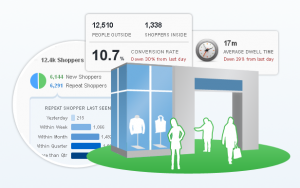Euclid Offers “Google Analytics For The Real World”
Yesterday Euclid Elements, a relatively new firm founded by some of the people behind the product that became Google Analytics, announced a $5.8 million first round of funding. The company is seeking to enable retailers and business owners with physical locations to measure things like foot traffic by time of day, average customer time in […]

Conceptually none of this is entirely new. There are a range of “analog” companies and methods that measure retail foot traffic. However Euclid tries to bring online analytics’ sophistication to offline locations with smartphone tracking.
Offline Tracking with Smartphones
At least since 2008 people have been talking about using smartphones to track retail foot traffic patterns. And many companies are now trying to connect online and offline behavior with smartphones in various ways (e.g., check-ins, digital coupon redemptions).
Each physical venue or store location using Euclid installs a sensor that tracks people with smartphones entering the store. The company then provides a familiar type of dashboard, showing the various metrics it’s tracking. And yes, not everyone has a smartphone. But while smartphones are still not in the majority (43%), they will be in short order.
Euclid doesn’t track individual users. They see and deliver data in the aggregate.
Online to Offline: There’s a Larger Story
Euclid may or may not gain traction. But what Euclid represents is more important: a larger movement to connect online ads or promotions and offline behavior.
The venerable paper coupon or traditional call tracking have been the two primary methods historically used to measure the efficacy of advertising on in-store sales or ads-to-store behavior. More recently call tracking has been expanded to online advertising and digital coupons redemptions or check-ins (to a lesser degree) are starting to provide more visibility into the impact of online promotions on offline sales.
As another example of the online-to-offline tracking trend, search and social marketing platform provider Kenshoo is now monitoring Facebook and Foursquare check-ins (via APIs) to see if particular search or social ads produced in-store lift. The methodology isn’t connected to keywords but at some point you’ll probably be able to track paid-search keywords to in-store conversions.
Big Changes Coming with New Data
Credit card issuers and point-of-sale vendors are also starting to measure in-store conversions and tie those back to online promotions. There are some scary plans around credit card purchase tracking and the sale of personal data. And mobile payments/wallets will also eventually yield this “closed loop” data too — with varying degrees of anonymity.
Indeed, privacy will have to be negotiated in all these scenarios; and some of the “more aggressive” ones will probably need to be restrained by legislation. However the Euclid solution doesn’t fall into that privacy danger zone because it’s anonymous and aggregated.
The larger point is that within three years, lets say, the in-store success of online and mobile advertising will be much more visible than it is today. Indeed, the “offline” data becoming available to digital marketers via smartphones, credit-card matching and POS data is going to dramatically alter online marketing.
Opinions expressed in this article are those of the guest author and not necessarily Search Engine Land. Staff authors are listed here.
Related stories
New on Search Engine Land
